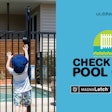
Before I moved to Los Angeles earlier this year, I ran a pool company in New Jersey for the better part of a decade. My brother and I had a residential and commercial service company and also taught CPO classes for the National Swimming Pool Foundation. We taught around 200 courses in 15 states, certifying upwards of 3,000 students a year.
After a successful run in the East Coast pool industry, I was pretty confident about my prospects on the other side of the country with its huge pool and spa market and solid economy.
When I moved to Los Angeles, however, I found a different reality than I had hoped. I thought it would be quite similar to N.J., but I was wrong. With low margins, scaled-up business models and the highest income tax rate in the U.S., I found my hand was just one of many trying to reach in and get a slice of the pie. Another thing I found after consulting some industry experts and local companies was a situation that I think a lot of people know about, but for one reason or another sweep under the rug — Title 20 compliance, specifically regarding pump laws.
In California, there is widespread disregard for a law that has been in place for nine years now. Pool professionals who know better break the law anyway for fear of losing business, and there's a total lack of questioning or concern from distributors and homeowners.
And with the Department of Energy seemingly pushing a law that has a very confusing rebate plan and zero enforcement efforts on the horizon, I ask myself: Is Title 20 falling on deaf ears?
The Law
Everyone in the industry has heard or read about Title 20. For brevity, I won't go into the law as it has been covered extensively both in AQUA and other outlets. (Google "Title 20 California" and you'll find a boatload of info.) Simply stated, if you are replacing a pump or motor larger than 1 hp, you have to use a variable or multi-speed pump. You can't use single speed.
But people do it anyway. All the time. This indifference to the law came as a big surprise for me. The view of much of the nation is that Californians are forward thinkers in their conservation, pollution and energy efforts. Once California tests and perfects legislation in these areas, the rest of the country follows suit. That may be true of laws, but the reality on the ground is a different matter.
I got involved in this by accident. It came up in conversation soon after moving out here. As I began to ask more questions, the answers I received were a different variation of the same general response: Lots of people sell illegal pumps in California, and it's really not fair to the people trying to follow the law.
I decided to look deeper into it. To get an unbiased view, I used my CPO Facebook group/Forum for pool professionals, which has over 1300 members. It has pool techs and C-level executives and representatives from all of the major manufacturers; it's a great mix of people. If you have a pool question, it's sure to get answered here. (To learn more, visit facebook.com/groups/sherwoodpoolconsulting.) This is where I went to research into the issue of Title 20 compliance. I wanted to know who was involved in breaking the law and how liable I would be if I did it, too. I soon found there are different perspectives on the issue. I'll look at them in order here, starting with the most important: the customer.
The Customer
This is usually what happens here in California: The customer needs a replacement for their dying or dead single speed pump. I offer the customer a variable speed replacement motor for $2,000+. My competition up the road offers to replace the same single-speed motor they already have for a few hundred bucks. Which do you think the client will choose? Sure, you have those clients that trust you wholeheartedly and the ones who listen when you tell them this is going to save them thousands in utility bills plus a cash rebate. But a lot of homeowners are strapped for "now" money, so this pitch isn't going to work. They have bills and the pool is green; they need whatever will get them up and running. Who can blame them for taking the cheapest alternative?
The Technician
In researching Title 20 compliance among service technicians, I chose 15 companies at random through my group and 15 others through the internet. I then asked these company owners what their plan of action was regarding Title 20. The short answer was yes, they knew the law but had mouths to feed and would not allow another company to come in and steal their clients by offering cheaper alternatives.
"So you offer the single speed pump?" I said.
"Yes, but you would never get us or anyone to admit that in a room full of peers."
Although I don't agree with it, I do see their point. I have a wife who is seven months pregnant and an apartment that surely costs more than most pay for their mortgage. (Sadly, our apartment is one of the cheaper places in the west side of Los Angeles.)
The Distributor
With an understanding of the techs perspective on the Title 20 pump issue, I wanted to see how hard it was to get an illegal single speed pump from a distributor.
I had a customer with a cracked impeller on his 2-hp, single-speed pump. It was a Jandy Stealth, manufactured from 2002 to 2008. They stopped making parts for this thing years ago.
So, I drove to one of my distributors to get a replacement. I don't blame the guys at the desk, but I was telling them exactly what had happened, where it happened and how I needed to replace this 2-hp single speed pump. They knew I was from out of town but had seen my face around. And not once, not ever, did the topic of Title 20 come up in discussion. Not even a, "Hey in case you've lived under a rock the last nine years …"
I drove out of my distributor's parking lot with parts they weren't supposed to be selling to me.
The Choice
So now that I know what is really going on with Title 20, I feel like I am forced into a tough position. On one hand, I need the work to support my family. On the other, should I really just ignore the law because everyone else seems to? How do you move somewhere new and tout yourself as an instructor and authority on the right way to do things when you're not doing it the right way yourself?
The choice for me and many others is to abide by the law and lose customers to the competition, or follow suit since there's really no enforcement anyway — and thus knowingly break the law. In my sampling of 30 companies, I know what nearly all of them chose. And to the three companies that I spoke to out of those 30 who are abiding by the law and only offering the variable speed option, I really do applaud you. I want to follow your example and not lose my shirt in the process.
So what is going to solve this problem? In all honesty, a lot of things need to happen for this to change, and it starts with the Big Three. If they keep manufacturing these single speed pumps and selling them where there is no enforcement and a general lack of concern from clients, distributors and professionals, guess what? Customers are going to keep using them. And as long as they keep using them, it's going to be hard for someone trying to do the right thing to sustain a profitable business.
And in all honesty, I want the success or failure of my business to come down to the service I give my customers, not an issue of law enforcement. I know I am going to make it just fine here in Southern California, but this unfortunate situation makes it harder.
Update, 11/15/16: In response to this story, the California Energy Commission reached out to AQUA with information about how to report Title 20 violations. To file an anonymous report or see case settlements, click here.
Comments or thoughts on this article? Please e-mail [email protected].
Steve Sherwood is from New Jersey where, prior to his recent move to California, he spent his life running his family's residential and commercial pool company — the largest independent vendor for NSPF CPO courses in the country. Although distant in proximity, N.J. and CA actually have many things in common, including a love of recreational water. Steve is finding out what's similar, what's different and what has to be done to become a profitable pool company on the opposite coast.




































